As an Amazon Associate I earn from qualifying purchases. See Full Disclosure Here
In recent years, the demand for natural and eco-friendly products in home care has grown significantly. Many people are turning to safe, non-toxic alternatives to replace harsh chemicals commonly found in household cleaning supplies and pest control solutions.
Among these alternatives, diatomaceous earth (DE) and essential oils have gained popularity for their natural properties and versatility.
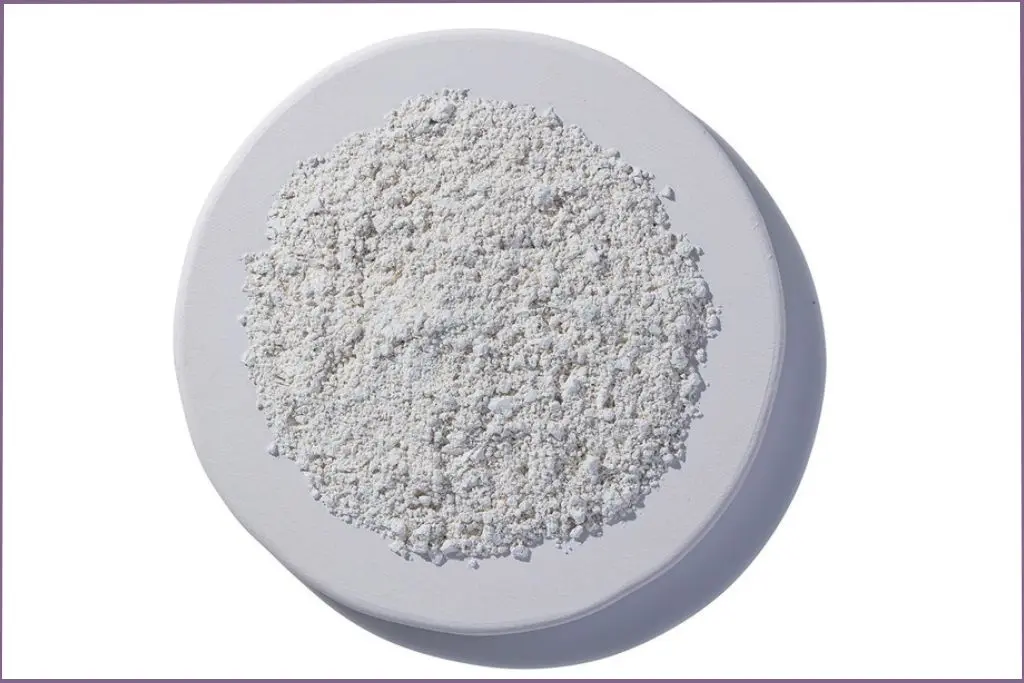
Diatomaceous earth, a fine powder made from fossilized remains of aquatic organisms, is valued for its ability to absorb moisture and its effectiveness in controlling pests.
Essential oils, on the other hand, are known for their pleasant aromas and antimicrobial properties, making them ideal for cleaning, deodorizing, and enhancing home environments.
Combining diatomaceous earth and essential oils can maximize their benefits, offering natural remedies for cleaning, pest control, and deodorizing. You can create a cleaner, greener home that’s safe for your family and the environment by using these two powerful ingredients together.
Table of Contents
What is Diatomaceous Earth?
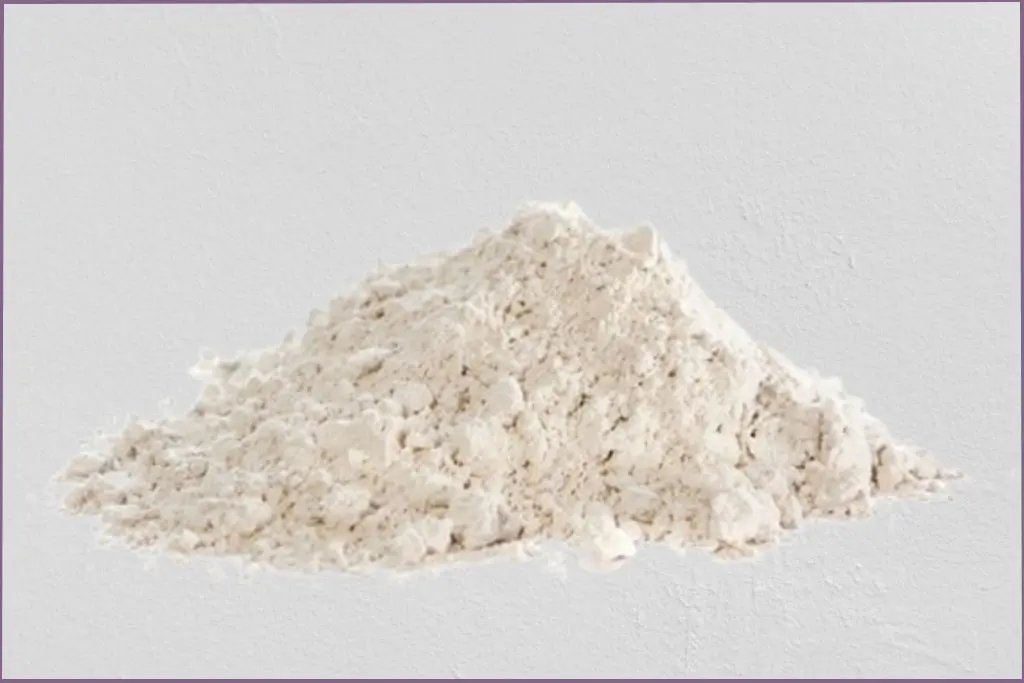
Diatomaceous earth (DE) is a naturally occurring, soft sedimentary rock that is crumbled into a fine, powder-like substance. It’s made from the fossilized remains of tiny aquatic organisms called diatoms.
Over millions of years, the silica-rich skeletons of these microscopic organisms accumulated in riverbeds, lakes, and oceans, eventually forming deposits of diatomaceous earth. This silica-based powder is widely used today for its absorbent and abrasive qualities, making it a versatile product for a variety of purposes.
One of the most appealing qualities of diatomaceous earth is that it is completely natural and non-toxic. Unlike chemical-based products, DE doesn’t pose a health risk to humans or pets, making it a great choice for eco-conscious households.
It is also highly absorbent, capable of soaking up moisture, odors, and even oil spills, which makes it a valuable tool for home cleaning.
In pest control, diatomaceous earth works by dehydrating insects, as the powder absorbs the protective oils from their exoskeletons, leading to their eventual demise. This makes DE a safe yet effective way to deal with common household pests like ants, fleas, bed bugs, and cockroaches without the need for toxic insecticides.
DE can also be used in household cleaning routines. Its fine, abrasive texture makes it an excellent scrub for tough stains on surfaces such as countertops, sinks, and bathrooms. When used in moderation, it can even be sprinkled on carpets or upholstery to absorb odors, after which it can be vacuumed up easily.
In all of these applications, DE should be handled safely. While it is non-toxic, it’s important to avoid inhaling the fine particles, so wearing a mask or using it in well-ventilated areas is recommended. This way, you can harness the power of diatomaceous earth safely and effectively in your home.
The Role of Essential Oils in Home Care
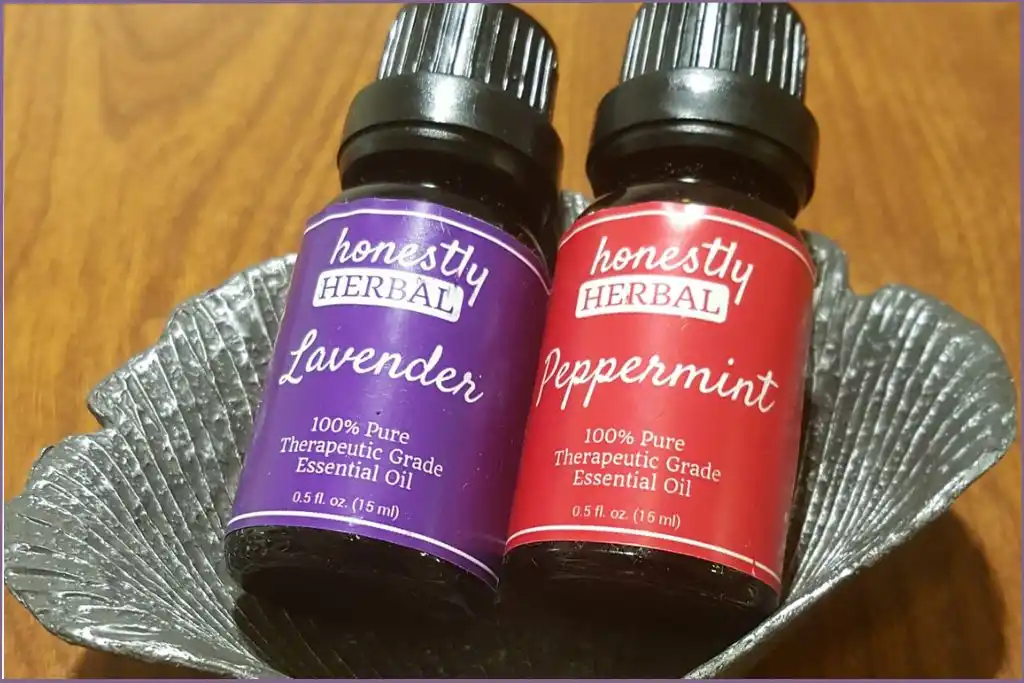
Essential oils are known for their aromatic qualities, but beyond their pleasant scents, they offer a wide range of practical benefits for home care.
Whether it’s cleaning, deodorizing, or pest control, essential oils provide a natural and effective solution for maintaining a healthy, chemical-free home.
One of the most appealing features of essential oils is their natural antimicrobial and antifungal properties. Oils like tea tree, eucalyptus, and lemon are known for their ability to kill germs and bacteria, making them excellent additions to homemade cleaning products.
Essential oils are also powerful deodorizers, capable of neutralizing unpleasant odors in the home. Lavender and peppermint oils are particularly effective for this purpose. Whether diffused in the air or added to DIY cleaning solutions, they can eliminate musty or stale odors while creating a calming, inviting atmosphere.
When it comes to pest control, essential oils such as eucalyptus, peppermint, and citronella are highly effective at keeping insects like mosquitoes, ants, and spiders at bay. Their strong aromas mask the scent trails that pests rely on for navigation, making your home less appealing to unwanted visitors.
By incorporating these essential oils into your home care routine, you can enhance the cleaning, deodorizing, and pest-repelling capabilities of your natural solutions. These oils not only provide effective results but also offer an eco-friendly alternative to the harsh chemicals often found in conventional household products.
Benefits of Combining Diatomaceous Earth and Essential Oils
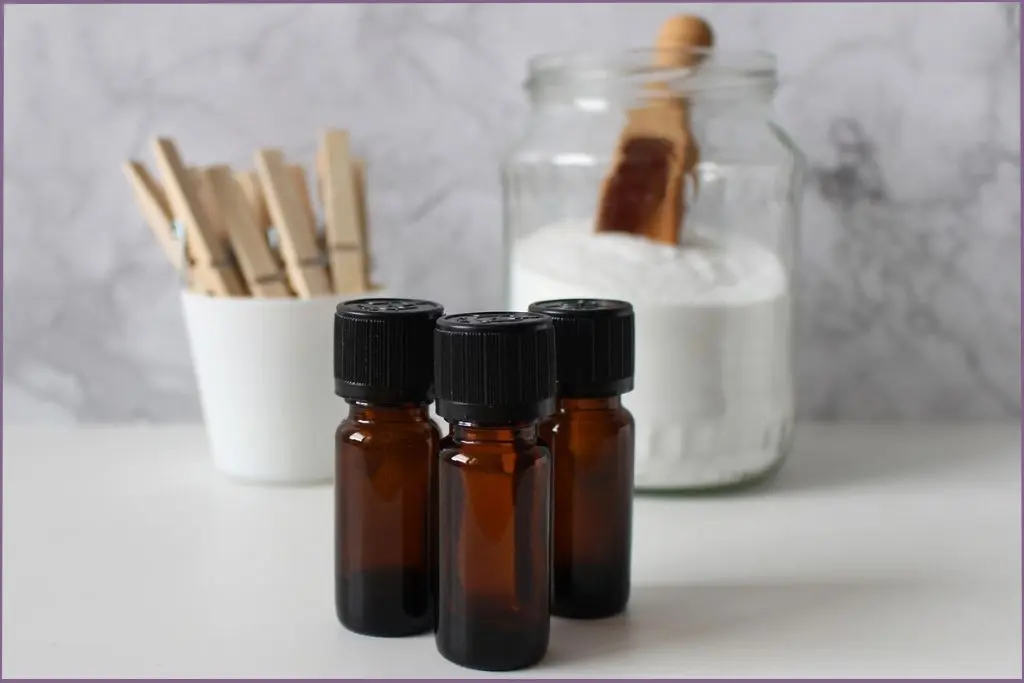
When combined, diatomaceous earth (DE) and essential oils create a powerful, natural solution for various home uses.
While DE offers a range of practical benefits like absorbing moisture, scrubbing surfaces, and controlling pests, the addition of essential oils elevates these effects by introducing natural fragrances and boosting antimicrobial properties.
This synergy makes the combination of DE and essential oils an ideal choice for cleaning, deodorizing, and even pest control in your home.
Aromatic Benefits of Combining Diatomaceous Earth and Essential Oils
One of the key advantages of using essential oils with diatomaceous earth is the added fragrance.
DE by itself is odorless, but essential oils like lavender, lemon, or eucalyptus bring fresh, pleasant scents to any cleaning or deodorizing task.
For example, when creating a homemade carpet deodorizer with DE, adding a few drops of lavender or peppermint oil can help neutralize odors while leaving a lingering, calming aroma throughout the room.
The same applies to DIY scrubs or dusting powders; a dash of essential oil not only freshens up the space but also enhances the overall cleaning experience.
Antimicrobial Benefits of Combining Diatomaceous Earth and Essential Oils
In addition to fragrance, essential oils contribute valuable antimicrobial and antifungal properties that complement DE’s effectiveness.
Oils like tea tree, lemon, and eucalyptus have been shown to kill bacteria, fungi, and viruses, which makes them an excellent choice for sanitizing surfaces. When combined with DE’s abrasive, absorbent qualities, essential oils can turn a basic cleaning product into a highly efficient natural disinfectant.
For example, mixing DE with tea tree oil can create a scrub that not only removes dirt and grime but also disinfects surfaces like kitchen counters or bathroom sinks.
Combining Diatomaceous Earth and Essential Oils For Powerful Pest Control
The synergy between DE and essential oils also extends to pest control. While DE acts as a physical barrier by dehydrating pests like ants, fleas, and bed bugs, essential oils such as peppermint, cedarwood, or citronella enhance this effect by repelling insects with their strong aromas. Sprinkling DE around the home’s entry points and infusing it with a few drops of peppermint oil, for instance, can keep ants and spiders at bay while maintaining an insect-free environment without resorting to toxic chemicals.
When you blend diatomaceous earth and essential oils, you achieve a cleaner, greener home while also enjoying the benefits of an all-natural, multi-purpose solution that addresses multiple household needs.
Cleaning & Deodorizing With Diatomaceous Earth & Essential Oils
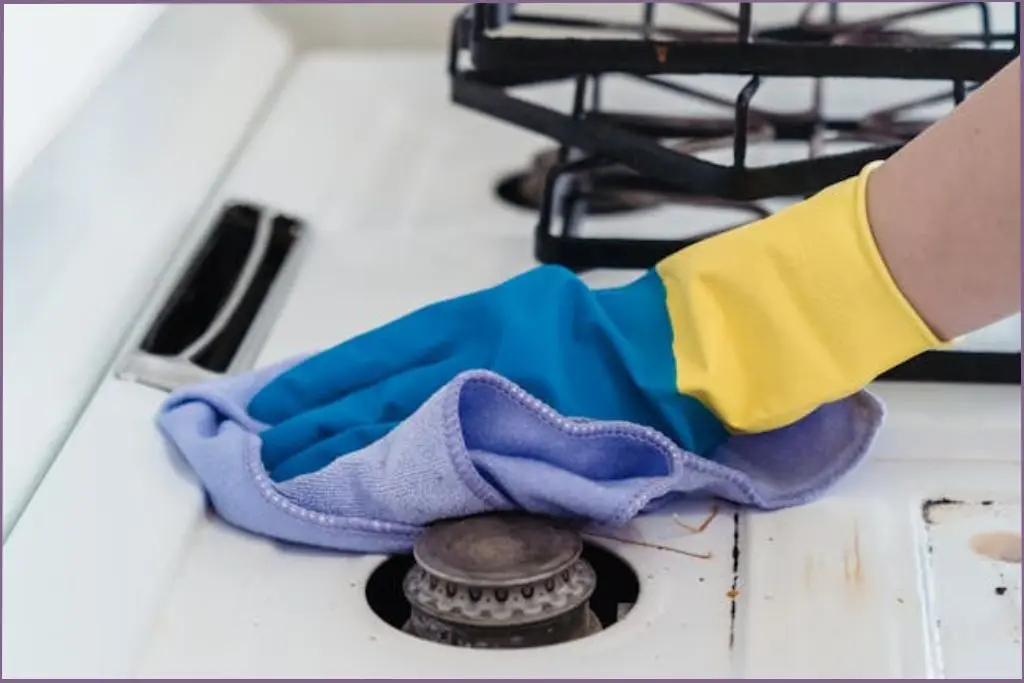
Diatomaceous earth (DE) is a versatile tool for cleaning and deodorizing your home.
When combined with essential oils, DE enhances its cleaning power and adds natural fragrances, creating a more pleasant and effective cleaning experience.
Diatomaceous Earth As An Effective Scrubbing Agent
DE’s gritty texture makes it an effective scrubbing agent that can tackle tough stains and grime on various surfaces without scratching them. Use it to tackle stubborn stains on countertops, sinks, and bathroom tiles.
The fine particles of DE work to dislodge dirt and grime, while its absorbent properties help lift and trap debris, making it easier to clean up.
Essential Oils To Enhance The Cleaning Power Of Diatomaceous Earth
Combining DE with essential oils boosts its cleaning effectiveness and also adds refreshing scents to your cleaning routine.
Here are some essential oils that work well with diatomaceous earth:
Lemon oil: Known for its degreasing properties and fresh scent, lemon oil helps break down grease and adds a citrusy aroma to your cleaning products.
Tea tree oil: With its natural antibacterial and antifungal properties, tea tree oil enhances DE’s ability to disinfect surfaces, making it ideal for use in bathrooms and kitchens.
Lavender oil: Lavender oil provides a calming, pleasant fragrance and offers mild antibacterial benefits, making it a great choice for general-purpose cleaning.
DIY Recipe for a Multi-Purpose Cleaning Scrub
Here’s a simple recipe to create a versatile cleaning scrub using DE and essential oils:
Mix together
- 1 cup diatomaceous earth
- ¼ cup baking soda (optional for extra cleaning power)
- 10 drops lemon essential oil
- 10 drops tea tree essential oil
- 10 drops lavender essential oil (optional)
Sprinkle the scrub onto the surface you want to clean. Use a damp cloth or sponge to scrub the area, then rinse to wipe clean.
This multi-purpose scrub is effective for cleaning countertops, sinks, and even bathroom tiles. The combination of DE’s abrasiveness and essential oils’ cleaning and antibacterial properties ensures a thorough cleaning with a pleasant scent.
Get more recipes for homemade natural, nontoxic cleaning products with essential oils.
Deodorizing With Diatomaceous Earth & Essential Oils
DE’s absorbent nature makes it an excellent choice for deodorizing various areas of your home.
By pairing DE with essential oils, you can tackle unpleasant odors while adding a fresh fragrance.
Carpets: To deodorize carpets, sprinkle a mixture of DE and your favorite essential oil (such as lavender or lemon) over the carpet. Allow it to sit for 15-30 minutes to absorb odors, then vacuum thoroughly. This method helps neutralize smells and refreshes your carpet.
Closets: Place a small sachet of DE mixed with essential oils inside your closets to keep them smelling fresh. You can use a small cloth bag or a breathable container to hold the mixture. This will help absorb moisture and prevent musty odors.
Shoes: To keep shoes smelling fresh, sprinkle a small amount of DE mixed with essential oils inside them. Let the mixture sit overnight to absorb any unpleasant smells, then shake out the excess DE before wearing the shoes.
Combining diatomaceous earth and essential oils provides effective results and also aligns with an eco-friendlier approach to home care.
DIY Personal Care With Diatomaceous Earth And Essential Oils
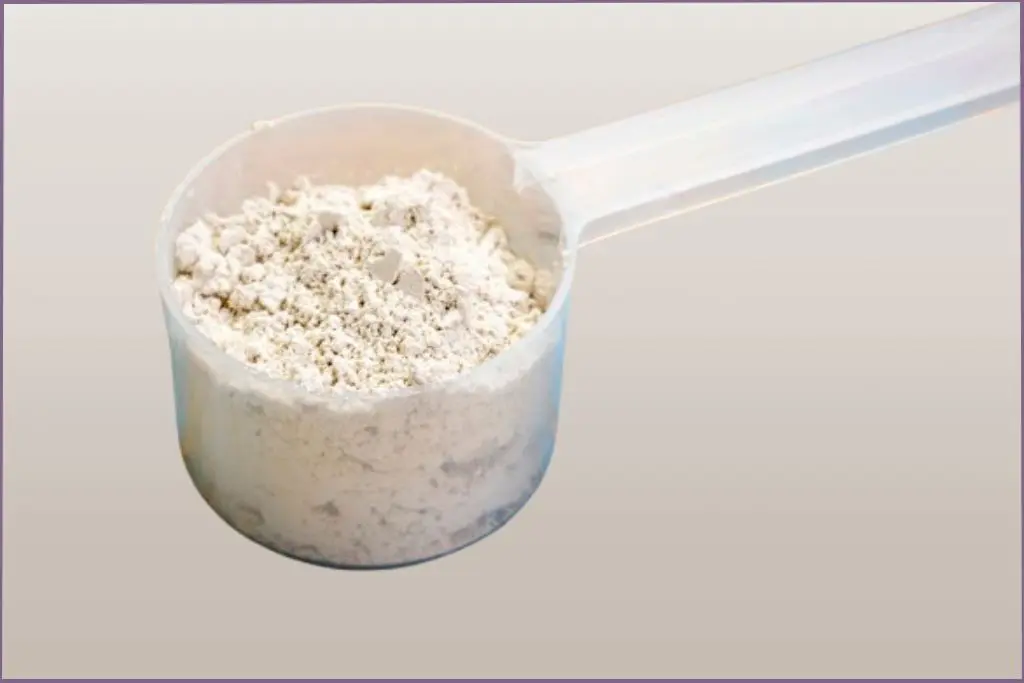
Diatomaceous earth (DE) is also an excellent addition to personal care routines. Its fine, gritty texture makes it a natural exfoliant that can help remove dead skin cells and promote a smoother, healthier complexion.
When combined with essential oils, DE can enhance the benefits of your skincare routine by providing soothing and therapeutic properties.
Using Diatomaceous Earth As A Natural Exfoliant
Diatomaceous earth is effective in exfoliating the skin due to its abrasive texture. It gently sloughs off dead skin cells, which can help unclog pores, reduce the appearance of blackheads, and improve overall skin texture.
This natural exfoliation can leave your skin feeling refreshed and rejuvenated.
DE is particularly beneficial for those with oily or combination skin, as it helps absorb excess oil and impurities.
When incorporating DE into your skincare routine, it’s essential to use it gently to avoid irritation. A mild exfoliation once or twice a week is usually sufficient to maintain healthy, glowing skin.
Pairing Diatomaceous Earth With Essential Oils for Exfoliating Scrubs
To complement the exfoliating properties of DE, you can pair it with calming essential oils that provide additional skincare benefits. Here are two excellent options:
Chamomile Oil: Chamomile is known for its soothing and anti-inflammatory properties, making it ideal for calming sensitive or irritated skin. It helps reduce redness and soothes any inflammation, providing a gentle touch to your exfoliation routine.
Lavender Oil: Lavender oil is renowned for its calming and antibacterial qualities. It helps to balance skin, reduce acne, and promote relaxation. Its soothing scent adds a relaxing element to your skincare routine, making it a great choice for a gentle exfoliating scrub.
DIY Recipe for a Homemade Face or Body Scrub
Here’s a simple recipe for a nourishing face or body scrub that combines diatomaceous earth with essential oils:
Combine:
- 1/2 cup diatomaceous earth
- 1/4 cup finely ground oats or brown sugar (for added exfoliation)
- 1 tablespoon carrier oil (such as coconut oil or olive oil)
- 5 drops lavender essential oil
Apply a small amount of the mixture to damp skin, gently massaging in circular motions. Avoid the delicate eye area. Rinse thoroughly with warm water and pat dry.
For a body scrub, apply the mixture to damp skin, focusing on areas that need exfoliation. Massage gently and rinse off in the shower.
This scrub helps to exfoliate dead skin cells, leaving your skin smooth and refreshed. The added essential oils enhance the scrub’s effectiveness and provides a calming and therapeutic experience.
Natural Pest Control with Diatomaceous Earth and Essential Oils
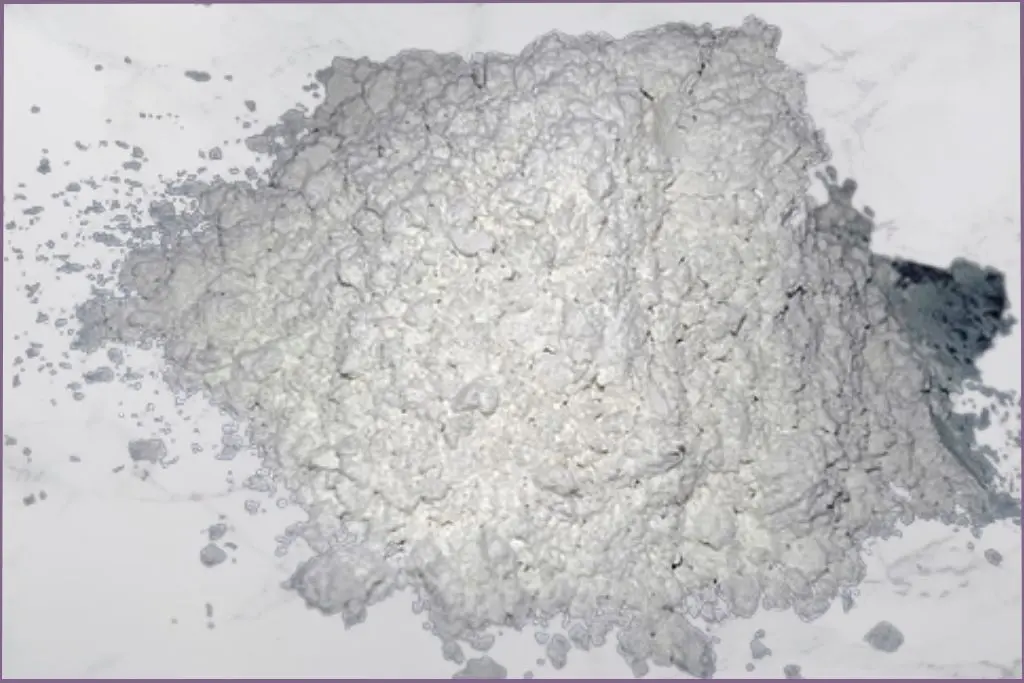
Diatomaceous earth (DE) is a highly effective natural insecticide that works by physically dehydrating pests.
When insects like ants, fleas, bed bugs, or cockroaches come into contact with DE, the fine, abrasive particles damage their exoskeletons, absorbing the oils and moisture that protect them from dehydration. Over time, this causes the pests to dry out and die.
Since DE is non-toxic and poses no harm to humans or pets when used properly, it’s a safe alternative to chemical pesticides for natural pest control.
One way to enhance DE’s pest-fighting abilities is by combining it with essential oils that are known for their insect-repelling properties.
Essential oils like peppermint, cedarwood, and eucalyptus are particularly effective at deterring a wide range of pests, including ants, spiders, and mosquitoes. These oils add an extra layer of protection by repelling insects also also introduce a pleasant, natural aroma that chemical repellents lack.
Peppermint oil is a powerful deterrent for ants, spiders, and cockroaches. Its strong scent overwhelms their senses, making it difficult for pests to follow scent trails or navigate the area.
Cedarwood oil works particularly well for repelling fleas, moths, and mosquitoes. It disrupts the pheromone receptors in insects, making it hard for them to reproduce and communicate.
Eucalyptus oil is commonly used to ward off mosquitoes, ticks, and flies, making it a great addition for outdoor pest control.
Tips for Mixing DE with Essential Oils for Indoor and Outdoor Pest Control
Create a DE and Essential Oil Pest Barrier
Mix a cup of diatomaceous earth with 10-15 drops of your chosen essential oil (peppermint, cedarwood, or eucalyptus).
Sprinkle this mixture around baseboards, window sills, and other entry points where pests are likely to come into your home.
The essential oil will act as a repellent, while the DE will kill any insects that come into contact with it.
Outdoor Pest Control for Gardens and Patios
For outdoor use, DE can be mixed with essential oils to repel insects like mosquitoes, ticks, and fleas from garden areas or patios.
Mix one cup of DE with 15-20 drops of eucalyptus or citronella oil.
Sprinkle this mixture around the perimeter of your garden beds, patio, or outdoor seating areas to create a natural pest barrier.
Reapply after rain or heavy watering to maintain effectiveness.
Safety Tips for Using Diatomaceous Earth and Essential Oils
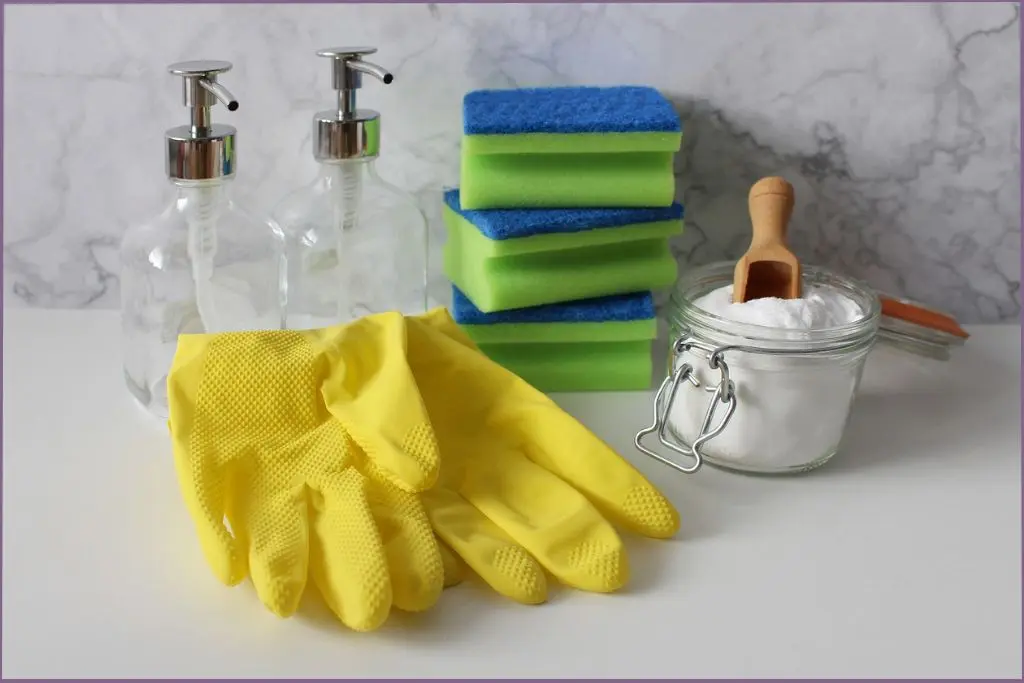
While diatomaceous earth (DE) and essential oils offer numerous benefits for home care and personal use, it’s essential to handle them with care to ensure safety. Proper usage and storage are crucial, especially when combining these natural products.
Here are some guidelines to help you use DE and essential oils safely:
Wear Protective Gear: When handling diatomaceous earth, it’s advisable to wear gloves to prevent skin irritation from coming in contact with the fine particle.
It’s also advisable to wear a dust mask to avoid inhaling the powder as it can irritate the respiratory tract. When possible use DE in a dampened form to reduce dust generation
Storage: Store diatomaceous earth in a cool, dry place, away from direct sunlight and moisture. Keep it in a tightly sealed container to prevent accidental spillage and maintain its effectiveness.
Essential oils are highly concentrated and should always be diluted before application to the skin or mixing into other products. For most topical applications, a safe dilution ratio is 1-2 drops of essential oil per teaspoon of carrier oil (such as coconut, olive, or jojoba oil).
For cleaning and deodorizing, follow specific recipes that indicate the appropriate amount of essential oil to use. Avoid using excessive amounts, as high concentrations can cause irritation.
Before using any essential oil on your skin, conduct a patch test to check for allergic reactions or sensitivity. Apply a small diluted amount to a small area of skin and wait 24 hours to see if any irritation occurs.
Store essential oils in dark glass bottles to protect them from light, which can degrade their potency. Keep them in a cool, dry place away from children and pets.
Precautions When Combining DE and Essential Oils
While DE and essential oils are generally safe, exercise caution when using them in homes with young children and pets. Ensure that all ingredients are kept out of reach.
Proper handling, storage, and cautious use ensure that these natural products contribute to a safer and more pleasant home environment.
Combining diatomaceous earth (DE) and essential oils offers a powerful, natural approach to maintaining a cleaner and greener home.
DE’s versatile properties as a natural scrubbing agent and pest control solution, paired with the therapeutic benefits of essential oils, provide an effective way to address various home care needs.
Whether you’re using DE for cleaning and deodorizing or enhancing its pest-fighting capabilities with essential oils, this duo offers an eco-friendly alternative to conventional products.
We encourage you to explore these ideas and experiment with combining DE and essential oils in your own home care routine.
Share your experiences or additional tips for using these natural products in the comments below or on social media. Your insights can inspire others to embrace eco-friendly solutions and enhance their home care practices.
Where to Buy Diatomaceous Earth

Diatomaceous earth is available for purchase at most garden centers and online stores such as Amazon.
The best place to buy high-quality food-grade diatomaceous earth is Starwest Botanicals.
Starwest Botanical’s Food Grade DE is considered GRAS (Generally Recognized As Safe) by the FDA. It has not been treated with high heat and contains less than 1% of crystalline silica.
Its GRAS certification means this DE variety can be used in food processing as a filtration aid as a component of composite filtration media.
Learn more about Diatomaceous Earth-Food Grade available at Starwest Botanical.
Expand your knowledge of diatomaceous earth with these informative books:
Frequently Asked Questions
What is the Difference Between Industrial-Grade and Food Grade Diatomaceous Earth?
Food-grade diatomaceous earth is safe for human consumption, while the industrial-grade variety is used only for non-food purposes such as pest control, filtration, and industrial applications.
Is Diatomaceous Earth Safe?
While DE is generally safe for humans and animals, it is important to take some precautions when using it. Always wear a dust mask and gloves when handling DE to avoid inhaling the powder or getting it into your eyes, as it can cause irritation. Keep DE out of reach of children and pets as it can be toxic if inhaled or ingested in large amounts.
Disclaimer: This information is not intended to serve as medical advice. Please consult your doctor before using any natural medication or if you experience any unusual symptoms. See Full Disclaimer here.






